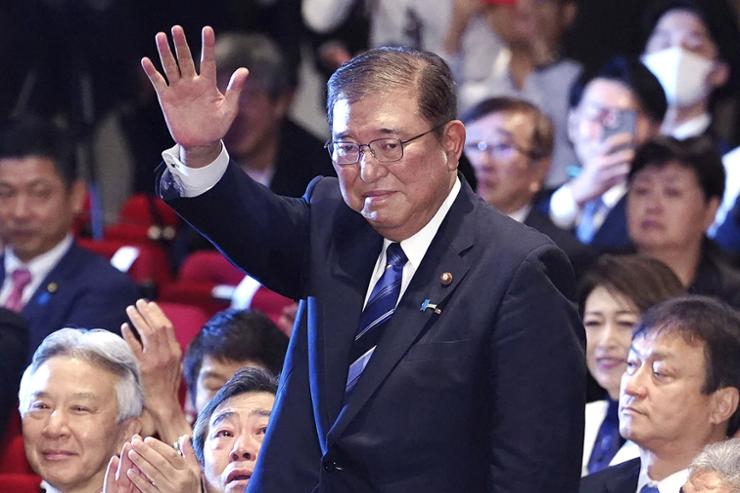WNAM REPORT: Newly elected Japanese Prime Minister Shigeru Ishiba’s progressive views on historical issues have raised hopes for continued momentum in improving Korea-Japan relations, experts said Sunday.
However, they cautioned against raising expectations too high for corresponding steps from Ishiba in response to concessions made by President Yoon Suk Yeol — gestures that were hardly reciprocated under outgoing leader Fumio Kishida — given Ishiba’s outsider status within the ruling Liberal Democratic Party (LDP).
Ishiba, a 67-year-old former defense minister, was elected the new leader of the LDP on Friday. He is set to officially take office as Japan’s prime minister on Tuesday.
The incoming prime minister’s approach to historical issues — a long-standing source of tension in Korea-Japan relations — is notably more progressive than that of his predecessors. He has openly expressed regrets about Japan’s misdeeds during the 1910-45 occupation of Korea, a rarity among LDP members.
In a 2017 interview with South Korean media, Ishiba stated that Japan should continue apologizing for the wartime sex slavery issue until South Korea accepts those apologies. He has also expressed somewhat negative views about visiting the Yasukuni Shrine, which enshrines 14 Class A war criminals from World War II. Such visits by Japanese officials often become a source of diplomatic tension with South Korea.
“Ishiba’s stance on historical issues is considered progressive,” said Lee Won-deog, a professor of Japanese studies at Kookmin University. “I would cautiously predict that this may help reduce friction between Korea and Japan on these issues, and the intensity of such disputes could weaken. At the very least, it’s unlikely that Japan will generate new sources of historical disputes under his leadership.”
Yoon, since taking office in May 2022, has sought to mend fences with Japan over historical grievances. However, he has faced growing domestic criticism for his perceived pro-Japan stance and conciliatory approach to Japan’s historical misdeeds.
Kishida, despite holding a dozen bilateral meetings with Yoon, failed to offer meaningful reciprocal gestures, fueling concerns that Seoul may have given up too many concessions without sufficient returns.
But Lee cautioned against expecting too much from Ishiba.
“I don’t anticipate that Ishiba will introduce meaningful gestures on sensitive issues such as the compensation plan for South Korean victims of wartime forced labor. Once a politician assumes leadership, their previous personal views often shift to align with the government’s official stance,” he said.
The professor noted that Ishiba, long considered an outsider within the conservative party, currently faces a challenge to form his own faction and broaden his support base among party members, which could mean his personal views may give way to the party’s mainstream stance.
In the diplomacy realm, Ishiba is expected to maintain many of Kishida’s policies, particularly regarding the alliance with the United States and strengthening the trilateral partnership between Seoul, Washington and Tokyo.
But some of his defense policies may complicate matters for Seoul.
“As a former defense minister, Ishiba tends to view international affairs through a defense-oriented lens. While this doesn’t pose an immediate direct threat to South Korea, defense issues are likely to be a focal point during his term,” Lee said.
In particular, Ishiba’s call for an Asian version of NATO to counter growing security threats from China and North Korea reflects his desire for Japan to play a larger role in regional security.
However, this proposal is expected to face significant opposition from both China and Russia.
For South Korea, which has been working to restore strained relations with Beijing through the resumption of high-level talks that could lead to a long-stalled leaders’ summit, Ishiba’s ambition for a military grouping could complicate these efforts.
Critics argue that the concept of an NATO-like security group in Asia remains unfeasible at this point, as the idea is unlikely to gain much support from Washington or other regional partners. But if Ishiba continues to push this policy during his term, the Yoon government may face challenges in its diplomatic balancing act.
In response to Ishiba’s election, South Korea’s foreign ministry expressed hopes for continued friendly relations.
“Our government will maintain close communication with the newly formed Japanese Cabinet and continue cooperation to sustain the positive momentum in Korea-Japan relations,” a ministry official said.
The new Japanese leader is expected to debut on the international stage at either the ASEAN Summit taking place in Laos next month or the APEC Summit slated for November in Peru, both of which the South Korean president is also expected to attend.
Regarding a potential meeting between Yoon and Ishiba, the foreign ministry said, “We will coordinate with the Japanese side on appropriate ways and timing, considering the new prime minister’s schedule.”


